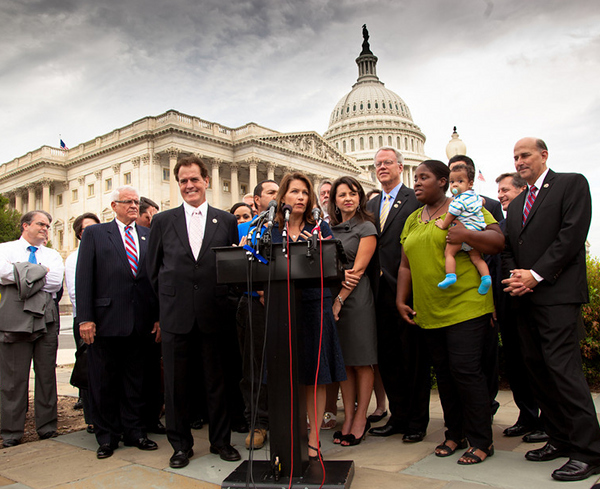The debt ceiling fight turned out to be a damper on the American economy, and for the approval ratings of political leaders in Washington. But it’s starting to consume the same political entity that decided to make raising it a major issue: the Tea Party. Last week saw the release of three separate polls that showed Americans are not just more skeptical of their movement, but growing tired of their role in the political process, which builds on previous evidence that the Tea Party is being pushed away by independent voters.
The Tea Party movement, as an idea, was originally about anger at the way things turned out after 2008. Congress had been taken over by Democrats, and President Obama came into office after a change election with high approval ratings and the political capital to make that change. Then, surprisingly, those Democrats didn’t work to enact Republican policies, they proposed and passed a few of their own. This was not how government is supposed to work, according to some very conservative Americans.
So they got some signs and some bags of tea and a few video cameras followed. They protested what they called an oncoming wave of socialism perpetrated by the Democrats who controlled the legislative and executive branches of government. Then they went to some town halls and yelled about the possible reforms to the American health care system. When that passed, they started supporting candidates for Congress that not only advocated the policies they wanted but also held the same contempt for the government process that they did. Then some of those candidates won, and they had to govern.
That’s really when more Americans started to have a more formed opinion on the Tea Party, and over the last few months that opinion has been turning increasingly sour.
“The Tea Party has become somewhat less popular over time, even before the current debt crisis,” said Carroll Doherty, Assistant Director of the Pew Research Center for the People & the Press. Pew itself had released some data showing as much: in April of this year there had been a fifteen point jump in the negative rating of the Tea Party amongst all voters in a Pew survey, up from a similar survey in March of 2010.
The Tea Party movement actually registered some decent favorability ratings when their associated members of Congress first arrived. There was a plurality in some polls that showed support for it when they were campaigning, which could mean a number of things. First, despite the conservative positions, the Tea Party presented an opportunity for people’s hope to break the traditional political orthodoxy. Partisan bickering is never popular. So when a group of people come along who don’t call themselves either Democrats or Republicans, why not give them a chance, and some people clearly did.
Doherty pressed that many Americans, except those who are most engaged, still don’t know what to make of the movement. “A lot of people still saying they have no opinion. Large percentages in these surveys are suggesting they don’t know much about it,” he said. “Because of its diffuse nature, there’s no single [Tea Party] leader, and it’s still not quite a familiar group to a lot of Americans.”
That certainly shows up in the numbers: the New York Times and CBS News ran a similar question in April of this year and in the first week of August, asking Americans if they had a favorable or unfavorable view of the Tea Party. The amount with “no opinion” changed little, as 43% were undecided in April, then 39% in August. But the negatives in the favorable/unfavorable pairing went up significantly in the same time period: it was 26 -29 in April, then 20 – 40 in August, directly after the debt deal was announced.
But in general, those who know the Tea Party are taking a more negative view. A CNN poll in January of 2010 showed that 33% of Americans had a favorable view of the Tea Party, against 26% who held an unfavorable view, and 24% who had never heard of it. A Washington Post/Pew poll from January of this year showed a small plurality 27%, thought the Tea Party supported candidates would have a positive effect on Congress, against 18% who thought they would be negative, and 39% who thought they wouldn’t make a difference.
As the Tea Party has actually effected policy (see: the debt ceiling showdown) those numbers have definitely changed. A new WaPo/Pew poll with the same question now finds that only 22% think the Tea Party is having a positive effect in Congress, and 29% think they’re having a negative effect, with 25% saying neither. The latest CNN numbers have shown a near doubling of those who have an unfavorable view of the Tea Partiers: from the 26% in January 2010, the unfavorable number has climbed to 51% in a poll conducted from August 5-7. And Gallup has tracked the popularity of the Tea Party movement, showing it with the lowest level of support since they’ve been polling the issue.
With the large plurality in these polls still saying they have no opinion about the Tea Party, there aren’t yet majorities of Americans saying they have a negative view of the movement. But the trend is certainly downward for the Tea Partiers, and with a little over seven months in office, it’s been a sharp fall.
Get the day’s best political analysis, news and reporting from the TPM team delivered to your inbox every day with DayBreaker. Sign up here, it takes just a few seconds.






